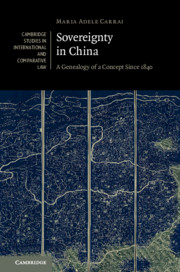(Source: CUP)
Cambridge University Press is publishing a new
book on the concept of sovereignty in China during the period 1840 to the
present.
ABOUT THE BOOK
This book
provides a comprehensive history of the emergence and the formation of the
concept of sovereignty in China from the year 1840 to the present. It
contributes to broadening the history of modern China by looking at the way the
notion of sovereignty was gradually articulated by key Chinese intellectuals,
diplomats and political figures in the unfolding of the history of
international law in China, rehabilitates Chinese agency, and shows how China
challenged Western Eurocentric assumptions about the progress of international
law. It puts the history of international law in a global perspective,
interrogating the widely-held belief of international law as universal order
and exploring the ways in which its history is closely anchored to a European
experience that fails to take into account how the encounter with other
non-European realities has influenced its formation.
ABOUT THE AUTHOR
Maria Adele
Carrai, Katholieke Universiteit Leuven,
Belgium
Maria Adele Carrai is currently a Marie Curie Postdoctoral Fellow at the Katholieke Universiteit Leuven and a Fellow at Harvard University Asia Center. She completed a Ph.D. in Law at the University of Hong Kong in 2016, where she received the Award for Outstanding Postgraduate Research Student for 2015–16, the Hong Kong Ph.D. Fellowship and the Swire Scholarship. Since she completed her Ph.D., she has been Princeton-Harvard China and the World Fellow (2017–18), New York University Global Hauser Fellow (2016–17), Max Weber Postdoctoral Fellow at the European University Institute, Florence (2015–17). Her research has appeared in various peer-review journals and she has spoken in a variety of fora.
TABLE OF CONTENT
Introduction
1. International law and the sinocentric ritual system: a nineteenth-century clash of normative orders
2. Secularizing a sacred empire: early translations and uses of international law
3. China's struggle for survival and the new Darwinist conception of international society (1895–1911)
4. China rejoining the world and its fictional sovereignty, 1912–1949
5. From Proletarian revolution to peaceful coexistence: sovereignty in the PRC, 1949–1989
Conclusion.
1. International law and the sinocentric ritual system: a nineteenth-century clash of normative orders
2. Secularizing a sacred empire: early translations and uses of international law
3. China's struggle for survival and the new Darwinist conception of international society (1895–1911)
4. China rejoining the world and its fictional sovereignty, 1912–1949
5. From Proletarian revolution to peaceful coexistence: sovereignty in the PRC, 1949–1989
Conclusion.
More info
here


No comments:
Post a Comment